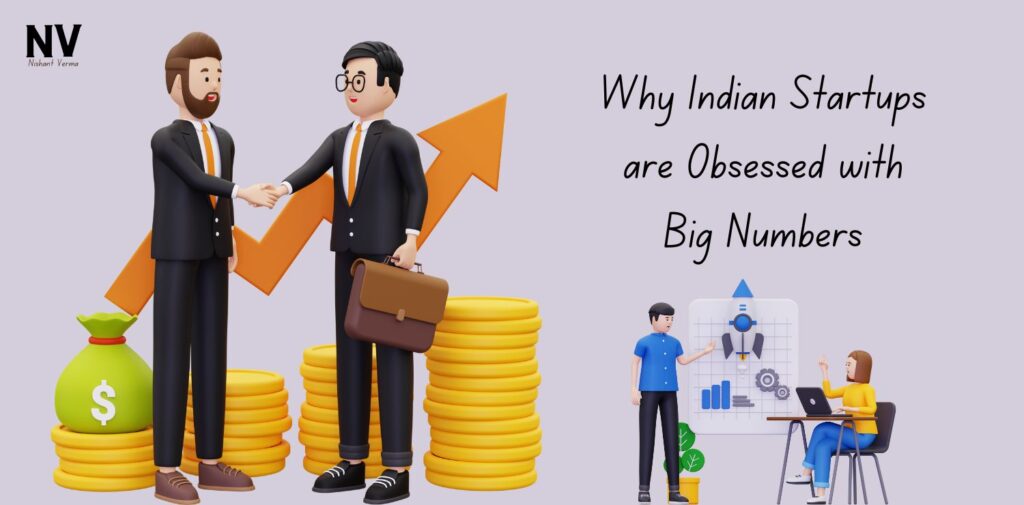In today’s booming startup ecosystem, valuation is a term you hear constantly. From headlines announcing unicorns to the excitement of billion-dollar milestones, it seems like the value a startup holds on paper is often more celebrated than its actual business achievements. But what exactly is the Pursuit of Valuation? And why are Indian startups so obsessed with achieving massive valuations, sometimes at the cost of profitability?
Let’s break this down.
What is the Pursuit of Valuation?
In simple terms, the valuation of a company is the price someone is willing to pay for the business. It’s essentially the estimated worth of a company based on various factors, including its revenue, assets, future potential, and market conditions. For startups, it’s a projection of what they could be worth in the future, not necessarily what they are making today.
In the world of startups, valuation is often tied to investment rounds. When a startup raises funds, investors offer money in exchange for equity in the company, and the valuation determines how much of the company they will get for their investment. For example, if a startup is valued at ₹100 crore and an investor puts in ₹10 crore, they will own 10% of the company.

The Valuation Frenzy: What’s Driving Indian Startups?
Indian startups, just like their global counterparts, are racing to reach massive valuations. But why is this the ultimate goal? Why is a high valuation such a big deal in today’s startup world? Here are some reasons:
- The Unicorn Status: A unicorn is a privately held startup that reaches a valuation of $1 billion (around ₹8,000 crore). In India, unicorn status is a badge of honor. It signifies that the startup has “made it,” and often leads to more media attention, more investment offers, and a better brand image. In recent years, India has become a breeding ground for unicorns, with startups like Byju, Paytm, and OYO reaching billion-dollar valuations. For many entrepreneurs, achieving unicorn status is the dream, as it signals that their company is a major player in the industry.
- Attracting Bigger Investments: A higher valuation means more investor interest. Startups with strong valuations attract bigger investment rounds, allowing them to expand, innovate, and outcompete their rivals. When investors see a high valuation, they believe that the company has great growth potential, which makes them more likely to invest. For example, when a startup raises a Series A round at a high valuation, it signals to future investors that the company has potential. This snowball effect can help startups raise larger funds at even higher valuations in the future.
- Founder Status and Influence: Valuation is not just a number; it can define the personal brand of the founders. In India, entrepreneurs like Flipkart’s Sachin and Binny Bansal or Ola’s Bhavish Aggarwal gained immense fame and influence after their companies reached massive valuations. This status can open doors to partnerships, political clout, and even personal investment opportunities in other ventures. For many startup founders, achieving a high valuation is a way to cement their legacy as pioneers of the Indian startup revolution.
- FOMO (Fear of Missing Out): Indian startups often chase high valuations because of the pressure to keep up with competitors. If a rival company raises funds at a high valuation, it creates a fear of missing out (FOMO) among other startups in the industry. They feel compelled to raise funds at a higher valuation to show that they are just as competitive and relevant. This cycle creates a valuation race, where startups try to outdo each other in securing bigger investments and higher valuations, regardless of their actual profitability or long-term sustainability.
- Growth at All Costs: Valuation is often tied to the concept of growth. Many startups, especially in sectors like e-commerce, fintech, and edtech, operate with the mentality of “growth at all costs.” They are willing to burn through cash and operate at a loss to acquire more users, expand to new markets, or build brand recognition. For these startups, a high valuation justifies their aggressive growth strategies. Investors are more willing to pump money into a company if they see rapid growth, even if the company is not profitable. In this way, valuation becomes a way to fuel the engine of growth.

The Downside: Is Valuation Everything?
While valuation is important, it’s not the only metric that matters. Chasing high valuations can come with significant risks. Here are some of the downsides:
- The Profitability Trap: Many Indian startups are valued at billions of dollars despite not turning a profit. Companies like Zomato, Swiggy, and Paytm have raised billions but are still struggling to become profitable. This raises the question: does a high valuation mean success? Startups that focus solely on valuation often neglect their path to profitability. They may raise funds at high valuations, but if they cannot turn a profit, they risk running out of cash or losing investor confidence.
- Overvaluation: Overvaluation happens when a company is valued higher than what it’s truly worth. This can lead to problems down the line, especially if the startup cannot meet the growth expectations tied to its valuation. If a company is overvalued, it might struggle to raise more funds or face difficulties during an initial public offering (IPO). In India, we’ve seen examples of companies that were overvalued and eventually had to lower their valuations or face financial difficulties. For instance, Snapdeal once had a valuation of over $6.5 billion, but after struggling to compete with Amazon and Flipkart, it saw its valuation drop significantly.
- Pressure from Investors: When a startup raises funds at a high valuation, it comes with strings attached. Investors expect significant returns on their investments, and this can lead to pressure on the founders to scale too quickly, cut costs, or even sell the company earlier than planned. Startups that chase high valuations may find themselves losing control of their company’s vision and direction as they cater to the demands of investors.

The Future of Valuation in Indian Startups
Despite the risks, Indian startups are likely to continue their obsession with valuation. The startup ecosystem is thriving, with billions of dollars flowing into the country from domestic and international investors. As India continues to produce more unicorns, the valuation game will only intensify.
However, it’s important for startups to strike a balance between valuation and long-term sustainability. Chasing valuation at the expense of profitability and innovation can lead to short-term gains but long-term challenges.
Conclusion: The Pursuit of Valuation-Beyond the Numbers
While valuation is a crucial aspect of the startup ecosystem, it’s not the be-all and end-all. Startups should focus on building strong, sustainable businesses that solve real problems, rather than just chasing the next billion-dollar milestone. Valuation is important, but it should be a byproduct of good business practices, not the goal itself.
Indian startups are undoubtedly making waves on the global stage, but as they continue to grow, they need to remember that true success comes from building companies that last—not just companies with big valuations.




